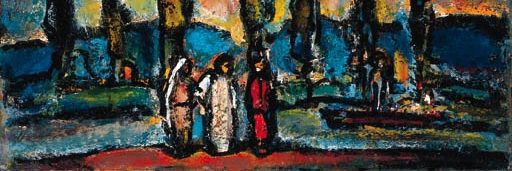My obscurity to myself, yours to me, and mine to you, are not puzzles, waiting for fruitful suspicion to uncover the real script, Marxian, Freudian, sociobiological (though all these stories may be true, need finding out). They are to do with the inescapability of taking time. ‘I do not really know myself’ must be heard as ‘I don’t yet know what to say; how to speak so that others listen and answer and build up in their words a way for me to go on speaking so that others may answer; how to become a partner in the world.’ The sense of a choked or imprisoned or elusive interiority is, on this account, a sense of skills not yet learned and nourishment not given, of not knowing what it might be to be heard and so set free — which is why the resolution suggested by a religious believer like Bonhoeffer has such powerful pertinence: I have been ‘heard’ by God, and I have been given words — of praise and penitence and thanks — that direct me away from the question of how I shall ‘know myself.’ I have been given time to learn what to say, with the help of the language of praise; because this is a language in which my finitude and limit are affirmed at the same time as my freedom and value, I may better learn from this how to speak to others without assuming their refusal, giving time to them and inviting them to give it to me.
Religious interiority, then, means the learning of patterns of behavior that reinforce the awareness of my finite and provisional status, my being in time. It is neither a flight from relation, not the quest for an impossible transparency or immediacy in relation but that which equips us for knowing and being known humanly, taking time with the human world and not aiming to have done with knowing (and desiring). Religious language can be the ally of projects of ‘suspicion’ to the extent that they question the easy, restrictive social practice that discourages taking time (puzzlement, invitation, dialogue) — the kind of practice or discourse we label ‘superficial’; the ‘false consciousness’ of the Marxist. The point at which suspicion itself is under criticism is when it comes itself to the point of discouraging the taking of time. The religious critique, as formulated by the writers we have been looking at (I have no qualms about seeing Wittgenstein’s polemic as ‘religious’ in this context), directs itself against the potentially tragic and inevitable self-and-other-diminishing fantasy of abstracting knowledge from attention and response, from a material history of action — from the world, in fact. But what sets it apart from pure human pragmatism is that it proposes to us a self-description enabling us to set aside once and for all the illusion that our value or ‘reality’ depends on the success with which we can activate a suprahistorical knowing subject in penetrating to the hidden structures beneath the world of time and flesh. As Augustine memorably put it, we are driven at last to fling ourselves down upon the human mortality, the skin and bone, in which the Wisdom of God speaks to us so that “in its resurrection we too shall rise.”
Rowan Williams, “The Suspicion of Suspicion: Wittgenstein and Bonhoeffer,” in The Grammar of the Heart: Thinking with Kierkegaard and Wittgenstein: New Essays in Moral Philosophy and Theology, Ed. Richard H. Bell, (Harper & Row, 1988), 50-51. Essays collected in honor of Paul L. Holmer
